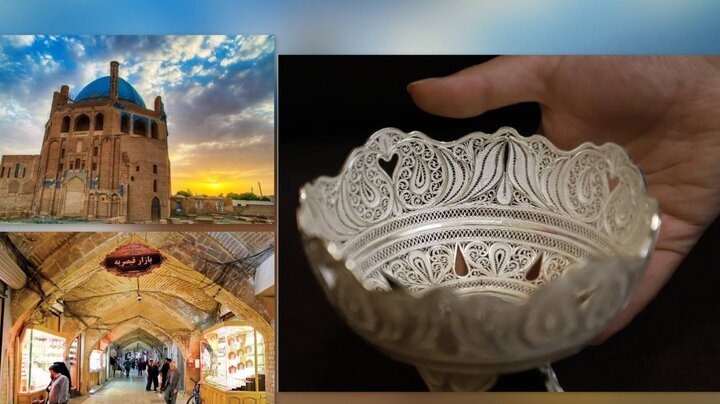Zanjan: The world city for filigree art

TEHRAN--Designated as the "World City of Filigree" by the World Crafts Council, Zanjan is celebrated for its exquisite craftsmanship and long-standing tradition in the delicate art of filigree work.
Located on the Commercial Silk Road and Iran–Europe transit way, Zanjan Province of Iran Zanjan is known for its handicrafts such as knives, traditional sandals and malileh (filigree), Mehr news agency wrote.
Zanjan offers a variety of handicrafts and local products that reflect the city's deep-rooted artisan culture.
Zanjan’s souvenirs offer a blend of beauty, craftsmanship, and cultural authenticity. At the heart of this tradition lies Malileh Kari, a true symbol of the city’s artistic excellence.
The filigree had been popular in Zanjan from thousands years ago. Zanjan is currently reputed as the birthplace of filigree work.
In 2019, this city was registered on World Crafts Council (WCC) list as the World City for Filigree. At present, thousands of filigree artists are active in Filigree workshops in Zanjan. In addition to the workshops, many other centers are now active in education, supply and sale of filigree works. This has led to a wide employment of different groups of people in Zanjan in this field.
Filigree (Malileh Kari)
Malileh Kari—the traditional Persian art of silver filigree—is one of the most celebrated handicrafts in Zanjan, a city globally recognized for its mastery in this delicate and intricate work. The craft involves twisting extremely fine silver wires into elaborate floral and geometric patterns, which are then carefully soldered to create decorative and functional items.
The art of Malileh Kari in Zanjan dates back several centuries. It was traditionally used to craft luxurious items for the nobility, religious institutions, and ceremonial purposes. Over time, the skill was passed down through generations, making Zanjan the national and now international center of this exquisite craft.
Designated as the "World City of Filigree" by the World Crafts Council, Zanjan is celebrated for its exquisite craftsmanship and long-standing tradition in the delicate art of filigree work.
In recognition of its cultural importance and craftsmanship, Zanjan was officially designated the “World City of Filigree” by the World Crafts Council. Today, the city’s workshops and artisan cooperatives continue to keep this tradition alive, offering both classic and contemporary designs that appeal to collectors and tourists alike.
Malileh Kari is more than just art—it supports local economies, attracts cultural tourism, and reinforces Zanjan’s identity as a center of fine Persian craftsmanship.
Traditional knives
Among the many celebrated handicrafts of Zanjan, the city’s traditional knives stand out for their craftsmanship, durability, and artistic value. These handmade blades are not only practical tools but also treasured souvenirs that reflect the region’s long-standing metallurgical traditions.
A Zanjani knife is more than a tool—it is a symbol of heritage, pride, and meticulous craftsmanship. Visitors to Zanjan often purchase these knives as authentic and memorable souvenirs of Iranian artisanal excellence.
Charoogh (traditional shoes)
Charoogh is a type of traditional handmade footwear that has been worn in Zanjan and parts of western Iran for centuries. These unique shoes reflect the region’s rich cultural identity and artisanal skill. Once part of everyday attire, today Charoogh is mostly produced as a cultural artifact and decorative souvenir.
Charoogh was traditionally worn by rural people, especially in mountainous and tribal regions, prized for its flexibility, comfort, and suitability for walking on uneven terrain. Over time, Charoogh making became a specialized craft, passed down through generations of local shoemakers.
Copper works
Coppersmith is an ancient craft in Zanjan with a long history. Currently, copper containers are made of copper sheet using hot- and cold hammering method. Different cupric containers such as boiler, bowl, and tankard tubs are produced in Zanjan.
Crafting process: Artisans use hand-hammering techniques to shape and decorate items, often engraving traditional Persian motifs.
Common products: Pots, trays, pitchers, samovars, vases, and ornamental dishes.
Modern relevance: Copperware is widely used in both traditional and contemporary Iranian homes, admired for its aesthetic appeal and health benefits when used in cooking.
Zanjan Jajim
Many people in Zanjan are engaged in Jajim weaving. Zanjani Jajim is woven from twisted wool called Alvan and has many uses such as bedspreads, mats and underlays.
Sometimes cotton thread and silk thread are also used in Jajim weaving. Zanjan jajims have different designs and colors and tourists buy them as Zanjan souvenirs.
KD
Leave a Comment